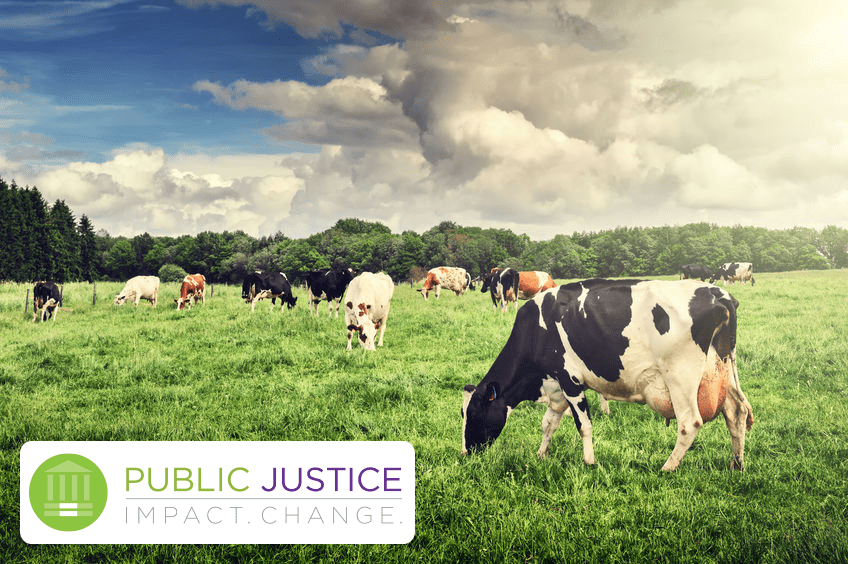
That cold glass of milk comes with a price: pollution. For years, dairy farms in the Lower Yakima Valley in Washington State had been dumping millions of gallons of manure onto crop fields and contaminating the air and local water supply for the rest of the community. But that’s all changing thanks to the work of our friends at Public Justice, a law firm dedicated to the public interest. They recently presented their 2016 “Change Maker” award to their team behind their “Yakima Dairy” cases.
In a landmark settlement back in May 2015, lawyers with Public Justice helped get thousands of residents in the Lower Yakima Valley their quality of life back. Families had been dealing with the ramifications of living just down the road from several concentrated dairy farms. Jessica Culpepper, an attorney for Public Justice, says there’s a point along the area’s highway where all you see are cows, but what you also see are loads of their manure spread onto the roads and sprayed into the fields. This, while dairy farmers pump the rest of it into unlined lagoons that leak through the soil and into the groundwater below.
According to the Associated Press, “Cow Palace” just one of the four dairy farms listed in the “Yakima Dairy” settlement, managed 11,000 cows alone. Those animals produced more than 100 million gallons of waste each year. Oregon Attorney Charlie Tebbutt says herein lies the fundamental problem: “Too many animals in too few acres.” In a documentary shown at Public Justice’s Annual Gala, he says dairy farmers were not land-applying the manure their farms created, but instead using the land as a means of disposal. As a result, the groundwater became contaminated with bacteria, dangerous chemicals, and nitrates (which can lead to “Blue Baby Syndrome,” a deadly condition where an infant is born with a reduced capacity to carry oxygen).
However, the actions of the dairy farms had an even wider impact: no safe drinking water for the thousands of people in the Lower Yakima Valley. Environmental groups like the Community Association for Restoration of the Environment say the agricultural area mainly relies on groundwater through wells, and a 2012 study by the Environmental Protection Agency already found that 20 percent of their 331 wells had nitrate levels unfit for human consumption.
So Public Justice brought the issue to the courts. In the documentary, Attorney Tebbutt says prior to this, no citizen suit under the Resource Conservation and Recovery Act had been successful up against a concentrated animal feeding operation anywhere in the country. Yet, this case would lead to a lot of firsts. It marked the first time a federal court has ruled manure not properly managed will be deemed as waste, and the pollution it causes will have to be cleaned up. Culpepper says before the “Yakima Dairy” case, many farms were exempt from regulation because they claimed their animal waste returned to the ground as fertilizer. However, she says the dairy farms in the Lower Yakima Valley produced so much manure, there was no way they could fall under this exemption, and a judge agreed.
Now, under the terms of the settlement, four Washington State dairies including the “Cow Palace” have to drastically change their operations. The farms must ensure their manure lagoons are lined at all times and provide clean drinking water to residents affected by the pollution. They will also be under strict groundwater monitoring by the EPA and the Department of Ecology. Plaintiff Helen Reddout says “People in the impacted zone will now have safe alternative water until the groundwater poisons go away.” She is right, but Culpepper says the work of Public Justice will also stretch farther than the Lower Yakima Valley and will go on to impact similar cases across the nation.
Right now, Public Justice is preparing for a follow up case scheduled on August ninth in Helendale, California. Culpepper says they hope to bring that community justice, too.
For more information about the Yakima cases, read Public Justice’s article here and click here to watch an excellent video about the topic.
President and CEO
Photo Credit: Paul Grecaud, Public Justice

